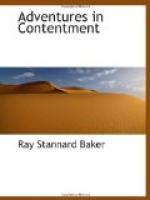——How surely, soundly, deeply, the physical underlies the spiritual. This morning I was up and out at half-past four, as perfect a morning as I ever saw: mists yet huddled in the low spots, the sun coming up over the hill, and all the earth fresh with moisture, sweet with good odours, and musical with early bird-notes.
It is the time of the spring just after the last seeding and before the early haying: a catch-breath in the farmer’s year. I have been utilising it in digging a drainage ditch at the lower end of my farm. A spot of marsh grass and blue flags occupies nearly half an acre of good land and I have been planning ever since I bought the place to open a drain from its lower edge to the creek, supplementing it in the field above, if necessary, with submerged tiling. I surveyed it carefully several weeks ago and drew plans and contours of the work as though it were an inter-oceanic canal. I find it a real delight to work out in the earth itself the details of the drawing.
This morning, after hastening with the chores, I took my bag and my spade on my shoulder and set off (in rubber boots) for the ditch. My way lay along the margin of my cornfield in the deep grass. On my right as I walked was the old rail fence full of thrifty young hickory and cherry trees with here and there a clump of blackberry bushes. The trees beyond the fence cut off the sunrise so that I walked in the cool broad shadows. On my left stretched the cornfield of my planting, the young corn well up, very attractive and hopeful, my really frightful scarecrow standing guard on the knoll, a wisp of straw sticking up through a hole in his hat and his crooked thumbs turned down—“No mercy.”
“Surely no corn ever before grew like this,” I said to myself. “To-morrow I must begin cultivating again.”
So I looked up and about me—not to miss anything of the morning—and I drew in a good big breath and I thought the world had never been so open to my senses.
I wonder why it is that the sense of smell is so commonly under-regarded. To me it is the source of some of my greatest pleasures. No one of the senses is more often allied with robustity of physical health. A man who smells acutely may be set down as enjoying that which is normal, plain, wholesome. He does not require seasoning: the ordinary earth is good enough for him. He is likely to be sane—which means sound, healthy—in his outlook upon life.
Of all hours of the day there is none like the early morning for downright good odours—the morning before eating. Fresh from sleep and unclogged with food a man’s senses cut like knives. The whole world comes in upon him. A still morning is best, for the mists and the moisture seem to retain the odours which they have distilled through the night. Upon a breezy morning one is likely to get a single predominant odour as of clover when the wind blows across a hay field or of apple blossoms when the wind comes through the orchard, but upon a perfectly still morning, it is wonderful how the odours arrange themselves in upright strata, so that one walking passes through them as from room to room in a marvellous temple of fragrance, (I should have said, I think, if I had not been on my way to dig a ditch, that it was like turning the leaves of some delicate volume of lyrics!)




